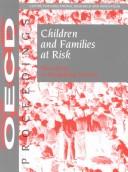| Listing 1 - 3 of 3 |
Sort by
|
Book
ISSN: 02534517 ISBN: 1280014687 9786610014682 0585248133 Year: 1993 Volume: no. 98 Publisher: Washington, D.C. : World Bank,
Abstract | Keywords | Export | Availability | Bookmark
 Loading...
Loading...Choose an application
- Reference Manager
- EndNote
- RefWorks (Direct export to RefWorks)

ISBN: 9264169660 9786610030453 1280030453 926416409X Year: 1998 Publisher: Paris OECD
Abstract | Keywords | Export | Availability | Bookmark
 Loading...
Loading...Choose an application
- Reference Manager
- EndNote
- RefWorks (Direct export to RefWorks)
BMLIK
integratie --- Children with social disabilities --- -Children with social disabilities --- -Problem children --- -Problem families --- -Socially handicapped children --- -#SBIB:316.8H15 --- #SBIB:316.334.1O340 --- Socially handicapped children --- Children with disabilities --- People with social disabilities --- Families at risk --- Families with problems --- High-risk families --- Multiproblem families --- Problem families --- Problem family --- Troubled families --- Families --- Difficult children --- Maladjusted children --- Children --- Behavior disorders in children --- Education --- Services for --- Welzijns- en sociale problemen: sociale ongelijkheid en armoede --- Onderwijs en sociale verandering, onderwijs en samenleving --- Dysfunctional families --- Problem children --- #SBIB:316.8H15 --- Services for dysfunctional families --- Social Issues/Migration/Health --- Social Welfare & Social Work --- Social Sciences --- Social Welfare & Social Work - General --- Services for.
Book
ISBN: 0821399004 0821398369 1299734626 Year: 2013 Publisher: Washington, D.C. : World Bank,
Abstract | Keywords | Export | Availability | Bookmark
 Loading...
Loading...Choose an application
- Reference Manager
- EndNote
- RefWorks (Direct export to RefWorks)
Indonesia has begun to emerge into middle-income status, yet persistent poverty and stark inequalities continue to affect young childrens development. This book tells the story of Indonesias efforts to change the trajectory of development for poor children. Many countries have similar aims, but several aspects of what is reported here are especially valuable and perhaps unique.The study offers data on all aspects of health and development in a sample of rural young children, collected with internationally-validated measures, as well as household information, information about parenting practices including feeding patterns, parent questionnaires, and data on the prevalence and distribution of ECED services. The data reported in this book is based on a sample of more than 6,000 Indonesian children living in 310 poor villages, including two age cohorts (aged 1 and 4 years old when data were first collected on their development in 2009). From the start, the project aimed not only to support service provision but also to support the development of national standards, build national and district capacity, and encourage the establishment of a system of ECED quality assurance, efforts that are still in process. Few such analyses have been done with such a large sample and with multiple measures. These design features allow a high level of confidence in the results that are reported. The lessons from this book will help to inform not only this projects further implementation but ECED initiatives in Indonesia and around the world. Thus, the results presented in this book are of significance for researchers, policy-makers, and practitioners within and beyond Indonesia. The experiences and research results discussed here are especially relevant for:Researchers in early childhood development and program evaluation;Policymakers within and beyond Indonesia;Providers of early childhood services; Professional development providers; andAdvocates for quality early childhood services.
Early childhood education --- Children with social disabilities --- Poor children --- Child development --- Children --- Education --- Social conditions. --- Childhood --- Kids (Children) --- Pedology (Child study) --- Youngsters --- Child study --- Development, Child --- Children of the poor --- Economically disadvantaged children --- Socially handicapped children --- Development --- Economic conditions --- Age groups --- Families --- Life cycle, Human --- Developmental biology --- Developmental psychobiology --- Child rearing --- Children with disabilities --- People with social disabilities
| Listing 1 - 3 of 3 |
Sort by
|

 Search
Search Feedback
Feedback About UniCat
About UniCat  Help
Help News
News